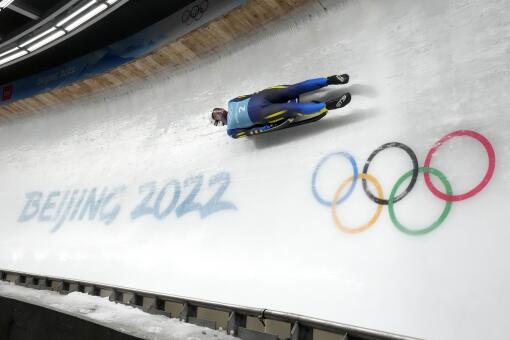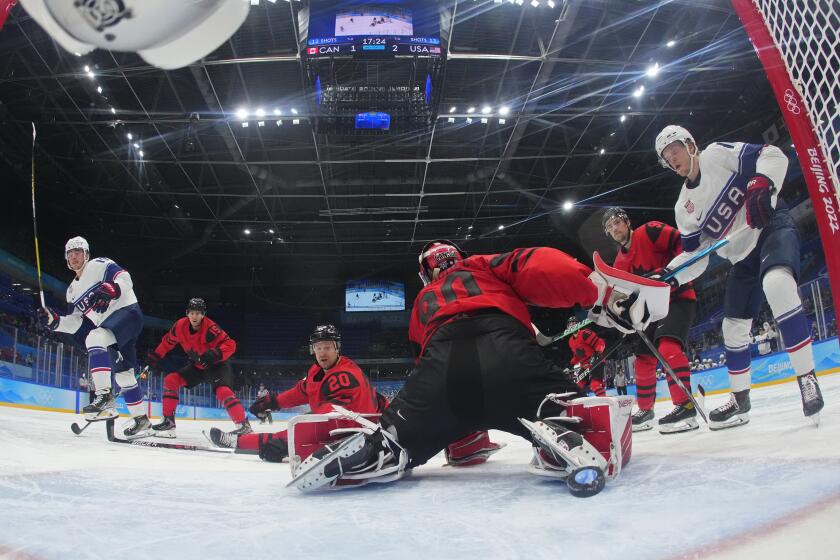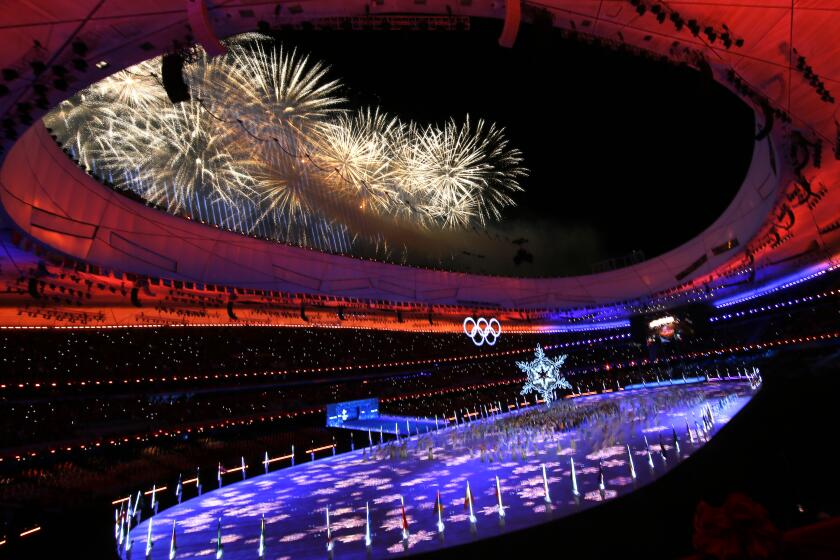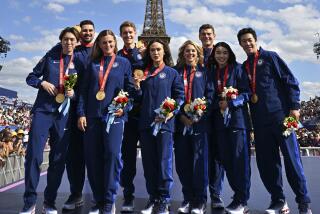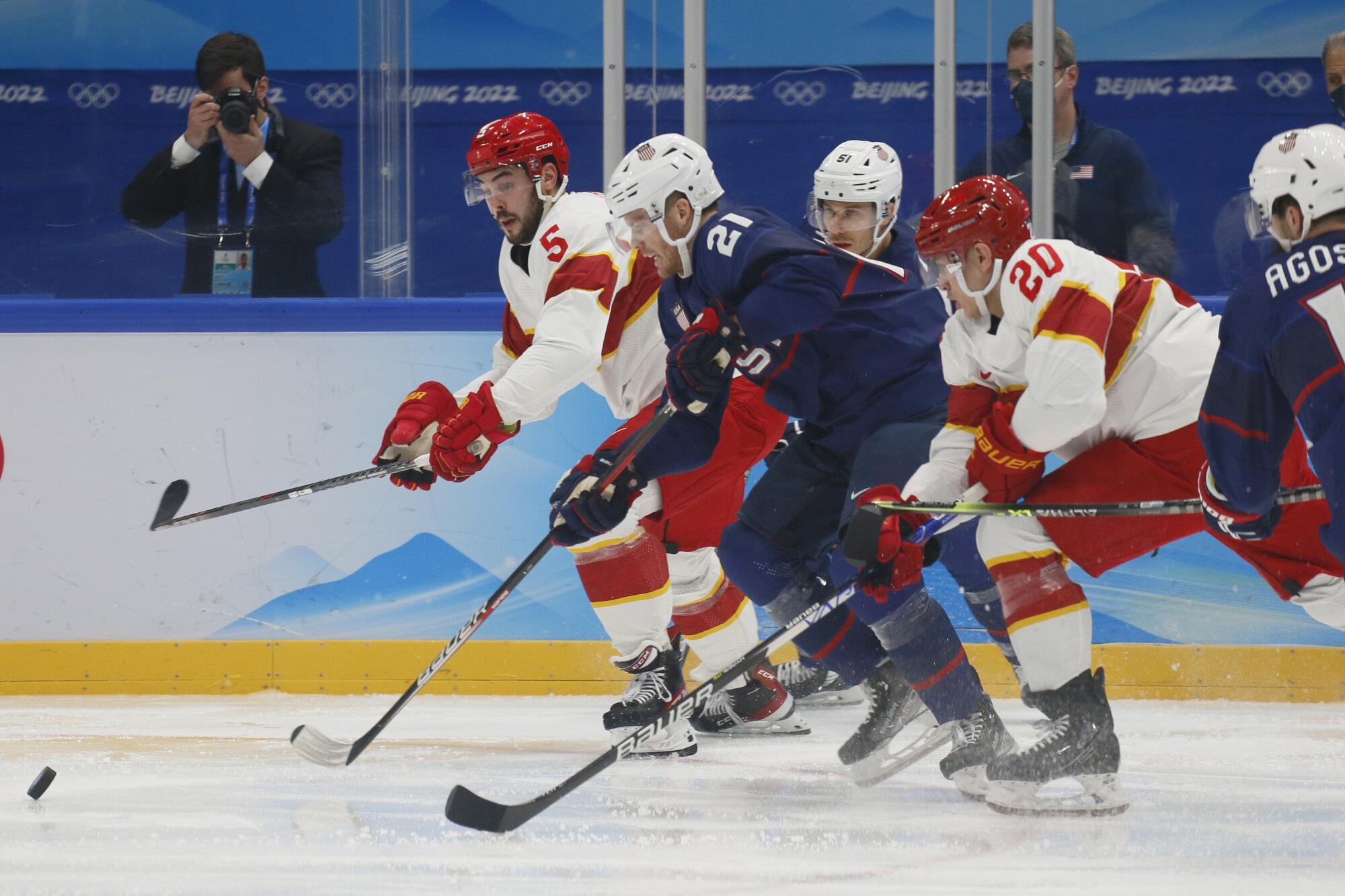
- Share via
BEIJING — The players agreed to take different names. Names they couldn’t necessarily pronounce at first. Jeremy Smith became Jieruimi Shimisi and Jake Chelios chose Jieke Kailiaosi, and maybe it seemed weird.
“A little bit,” said Spencer Foo, who became Fu Jiang. “Yeah, I picked it up pretty quick.”
Few of them spoke Chinese or had spent time in China, but they knew the difference between a forecheck and a cross check. That sufficed to draw these hockey players together, transport them halfway around the globe and plunk them down in a new country.
Which made perfect sense to them.
“There’s a bigger picture,” said Ye Jinguang, who grew up in British Columbia as Brandon Yip. “We’re here to grow the game.”
The Chinese men’s hockey team made its Winter Olympic debut in Beijing last week, part of a grand experiment by the government to build a national hockey program from scratch, in a hurry.
The roster featured minor-league talent gleaned from throughout North America — players with some Chinese ancestry or who were willing to live in country for several years. Team officials also asked them to take those transliterated names.
Not everyone was thrilled about this prefab roster.
The head of the International Ice Hockey Federation suggested China withdraw from the Games for “insufficient sporting standard.” In other words, he worried the team would lose by lopsided scores and make his sport look bad. The federation relented, but serious doubts lingered, especially in the media.
It was no secret to Jieruimi, the goalie, who said: “You read the articles.”
::
An undeniable buzz filled National Indoor Stadium as China took the ice Thursday night to play the United States. Cheerleaders danced to American pop music as a good-sized crowd — by coronavirus pandemic standards — waved small Chinese flags.
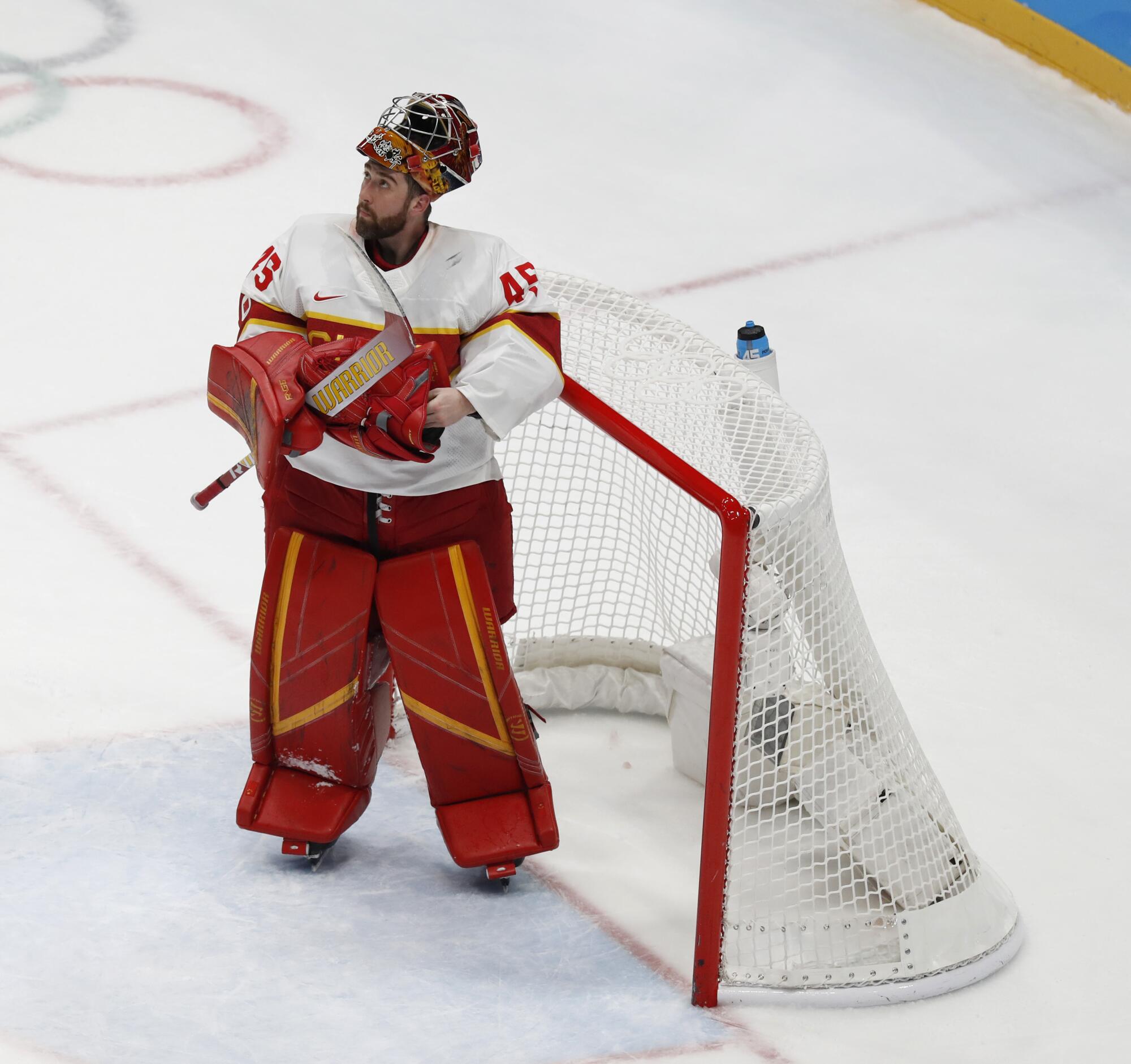
The home team skated out in red shorts and red helmets, the country’s name emblazoned in gold across clean, white sweaters. Maybe fans got a little too excited, cheering every time one of their players so much as touched the puck, even far from the goal.
Fortunately for the Chinese squad, the NHL had withdrawn from the Olympics in December because of COVID-related postponements in its schedule. Instead of a roster packed with all-stars, the U.S. brought mostly college players.
The Americans were clearly faster and more skilled, but the older Chinese could flex some muscle. Fans “oohed” when 30-year-old Jieke upended U.S. forward Noah Cates, still a senior in college, at mid-ice.
“We were playing against men,” sophomore Sean Farrell said. “They were a little bit bigger, a little bit stronger.”
U.S. men’s hockey team has 15 college players who bring enthusiasm, energy and skill, meaning the team may go into the later rounds of the tournament.
Thrown off-balance, the U.S. managed one goal during the first period, giving the Chinese hope.
“I mean, we were all super-excited,” said Yuan Junjie, previously known as Zach Yuen. “If you watched the game, they outshot us, but I think we stuck to them pretty well.”
The good feelings did not last long. The Americans took control, and three goals in rapid succession pushed the score to 4-0.
In the end, the game became precisely the kind of embarrassment federation officials had feared: United States 8, China 0.
Jieruimi tried to remain optimistic after facing a fusillade of 55 shots, saying: “Who knows, if I make a couple saves, maybe we get a couple goals, all of a sudden it changes.”
::
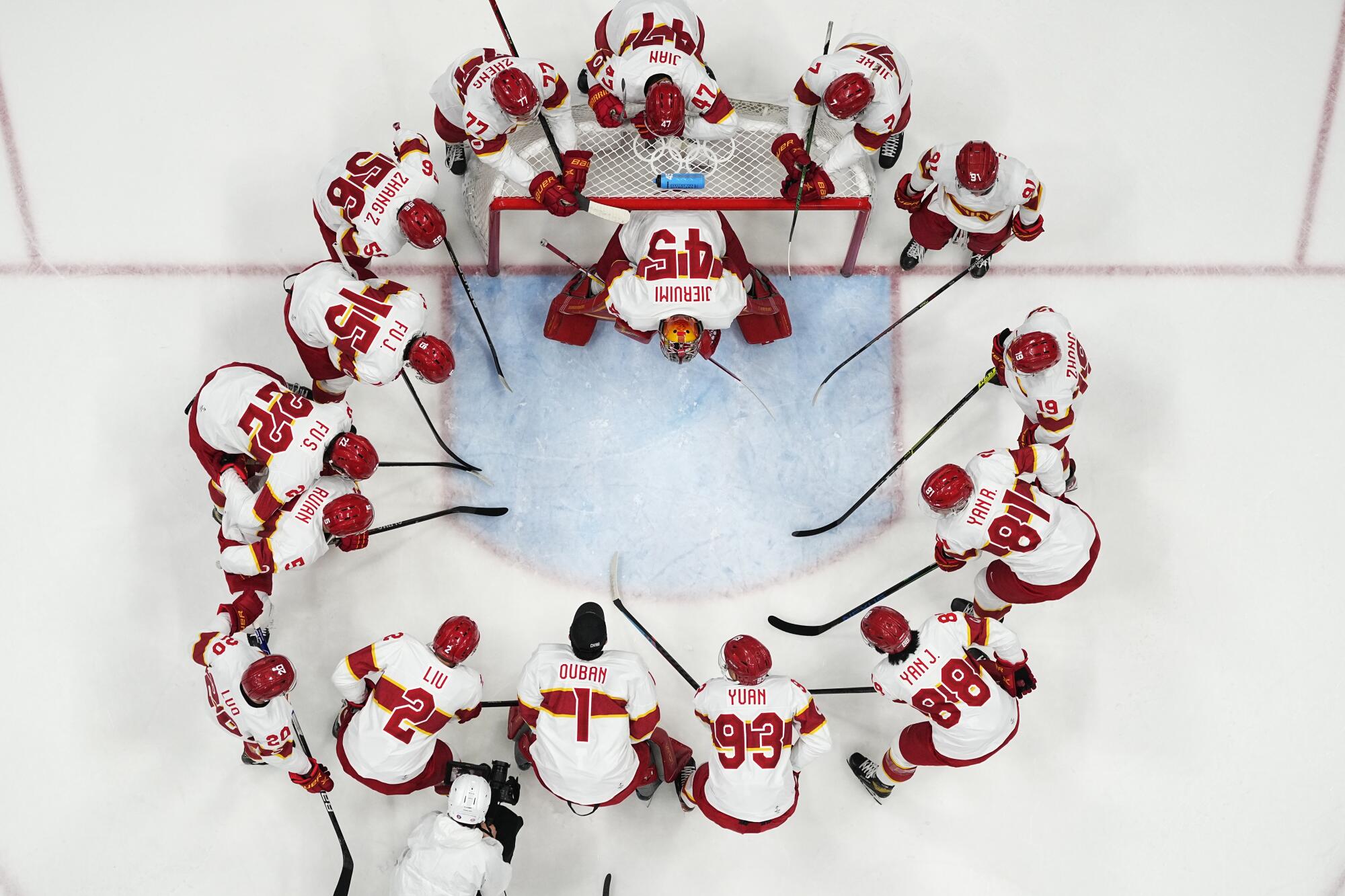
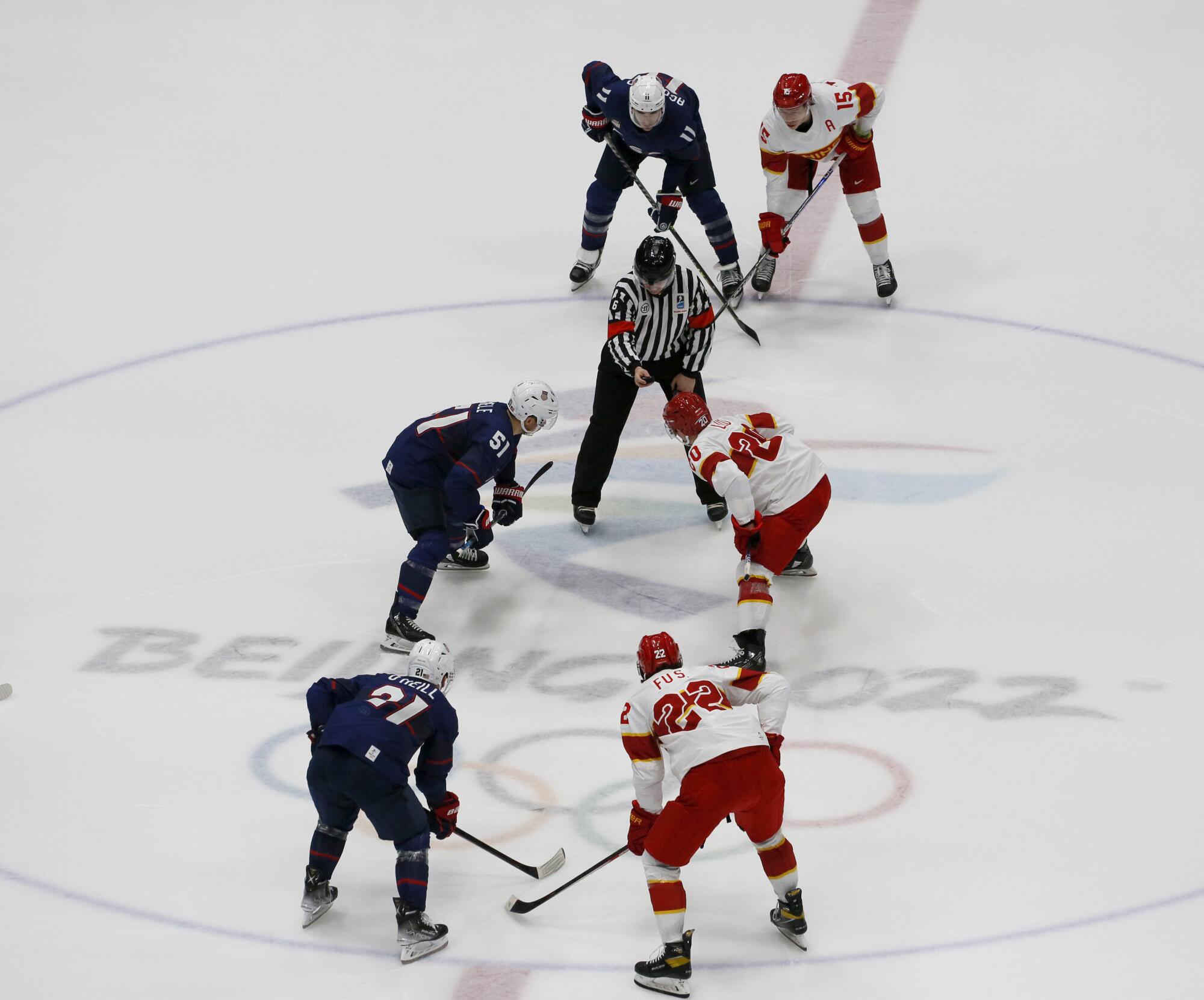
Nation-swapping is hardly new to the Olympics. African distance runners move to the U.S. or Germany for college scholarships and financial support. Bulgarian weightlifters are granted citizenship to compete for Qatar.
Unlike some of those instances, the Chinese aren’t shopping for medals with their hockey imports.
“It’s not only about competing in the Olympics,” Ye said. “It’s about making China proud.”
As hosts for the 2022 Winter Games, the Chinese were granted automatic spots in every sport. That wasn’t a problem for their improving women’s hockey program, but this nation of 1.4 billion people did not have enough men who knew the game.
China began recruiting players about five years ago, gathering three-fifths of its 25-man roster from the U.S. and Canada. Some had brief NHL experience — such as Jieke, son of NHL great Chris Chelios — but most were career minor-leaguers.
The passport and citizenship status of these visitors remains unclear. Players sidestep such questions with a dexterity employed to avoid a hip check along the boards.
Several coaches came and went before the program settled on Ivano Zanatta, a former Italian player. Looking for experience, the Chinese negotiated to play in Russia’s professional Kontinental Hockey League, losing 39 of 48 games. Hardship forged a closeness.
“In the locker room, we’re family,” Jieruimi said. “We know that we’ve worked hard to be here.”
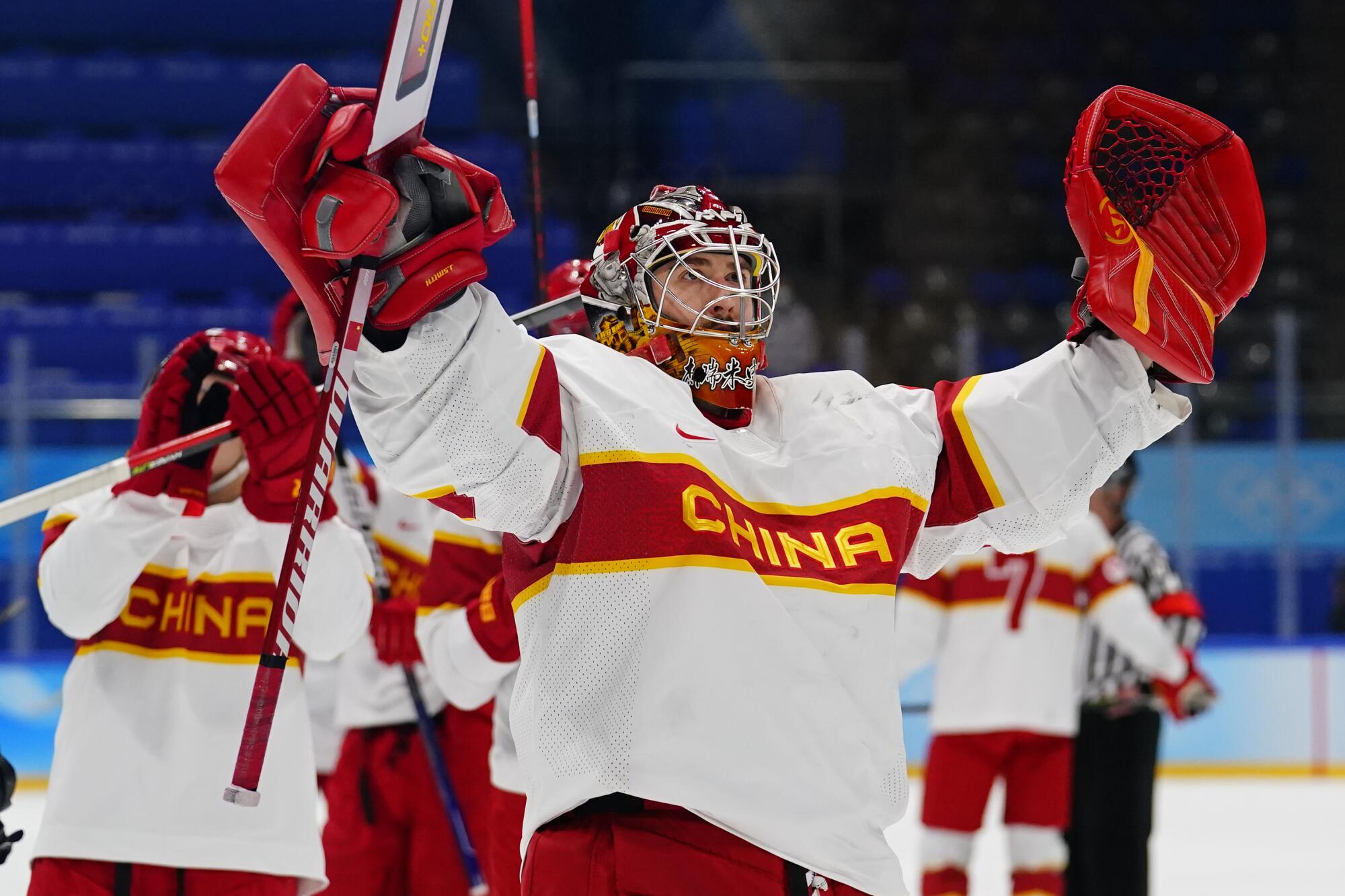
The international hockey federation allowed them into the Olympics only after watching a two-game audition against Russian professionals. Now comes a potentially more-cynical audience.
“Chinese fans can be nasty to anybody who loses,” said Susan Brownell, an American who ran track for Beijing University as a student and now studies Chinese sports culture at the University of Missouri-St. Louis. “This has been a problem for decades.”
The pressure might be even greater because so many of the players are foreign. Though some clearly look to be of even partial Asian descent, the same cannot be said of Wei Ruike — otherwise known as Ethan Werek — with his pale skin, long hair and scruffy beard.
“There is something bigger at stake in general, and that is the whole idea of bringing in foreigners,” Brownell said. “What they are doing is an experiment and, if the public does not react well, they could shut it down.”
::
On Saturday night, a lightly regarded German team took control from the opening faceoff, forging ahead by three goals, forcing the National Indoor Stadium into a sullen hush.
Then midway through the second period, something changed. The Chinese players began skating harder, finding open space on the ice, getting to loose pucks. As Ye put it, “maybe a little desperation came into play.”
Suddenly it was the Germans who looked shaky, slow, constantly retreating. Fu Shuai — otherwise known as Parker Foo and Spencer Foo’s brother — ended the second period by lifting a rebound over the sprawling German goalie for China’s first-ever Olympic goal. Wang Taile — Tyler Wong — scored on a power play early in the third to make the score 3-2.
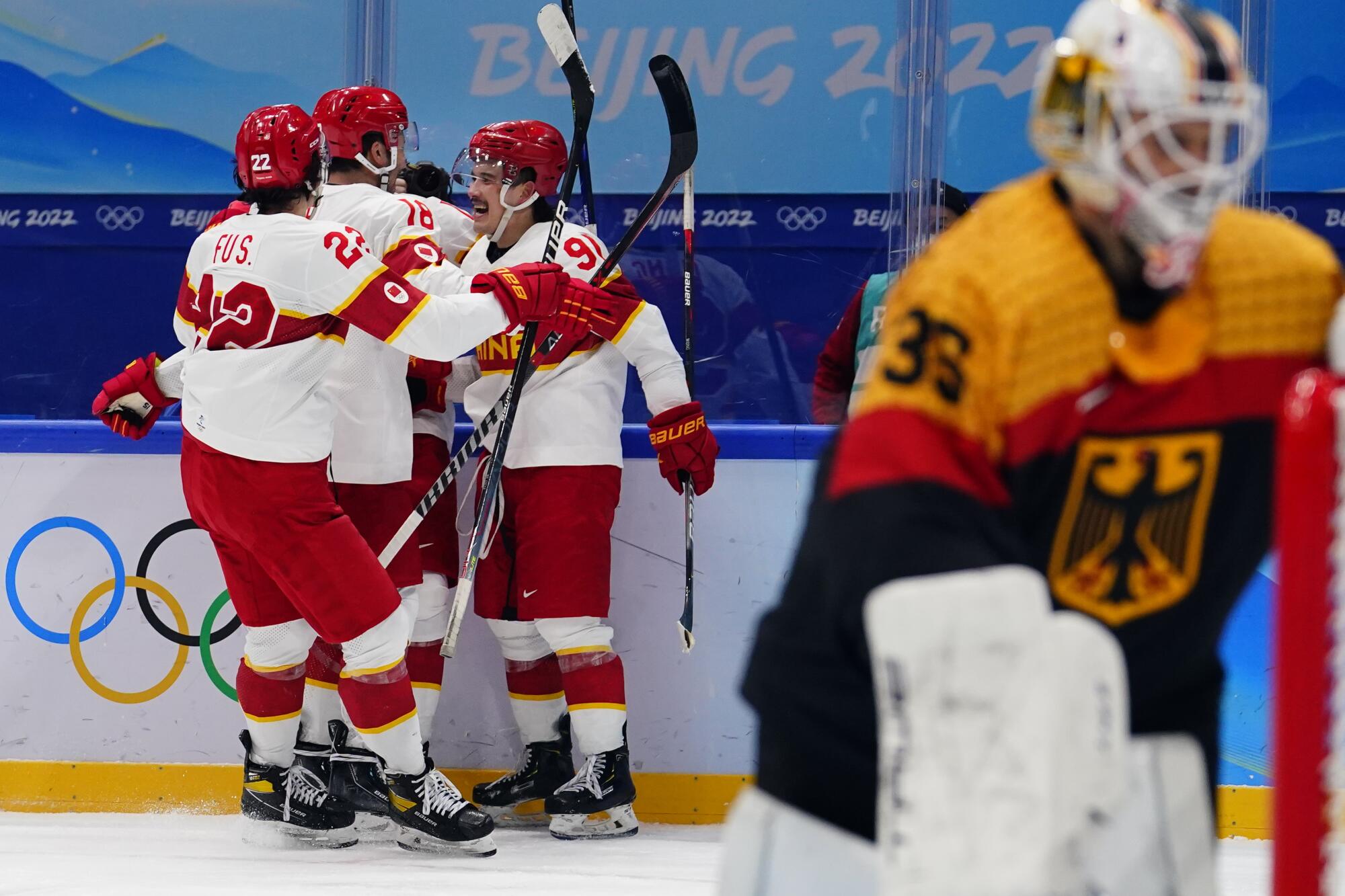
“We had a chance,” coach Zanatta would say later. “The boys believed.”
And the fans, now awakened, filled the arena with chants and cheers, waving their flags. It was the type of reaction the team had hoped for.
“If we see a couple boys and girls watching us play, they start to pick it up and start growing the sport here,” Ye said, “that’s definitely mission accomplished.”
Through the chaotic final minutes, through rush after rush at the net, China created chances but could not manage a tying goal. It almost didn’t matter.
When the horn sounded, players skated around the ice, waving as if they had won the Stanley Cup. The crowd stood and applauded. The puck from Fu’s historic goal was whisked away to the sports’ hall of fame in Toronto.
Recapping the news, results and highlights from The Times’ team of reporters who covered the 2022 Beijing Olympic Games.
A smiling Jieruimi described emotions rolling over him and his teammates like an incoming tide. He called it the first page in the history book of Chinese hockey, a work in progress. He called it redemption.
“We’re not lucky to be here,” he said of the Olympics. “We belong here.”
The goalie had his mask, decorated in reds and golds, cocked back on his head. A while ago, this native of Dearborn, Mich., had asked a local artist to paint traditional Chinese characters across the chin — they spell out his new name.
More to Read
Go beyond the scoreboard
Get the latest on L.A.'s teams in the daily Sports Report newsletter.
You may occasionally receive promotional content from the Los Angeles Times.

